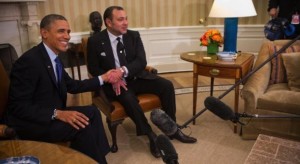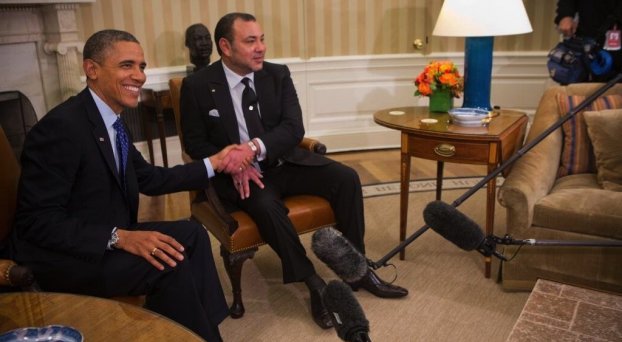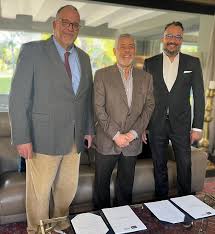 As changes continue to redesign the landscape in the Middle East-North Africa region and in Africa, Morocco’s longstanding, friendly relationships with these two regions open new avenues for U.S.-Morocco cooperation, all the more so as the two countries have a shared vision on a set of regional issues, ranging from economic development to stability, from political reform to counterterrorism.
As changes continue to redesign the landscape in the Middle East-North Africa region and in Africa, Morocco’s longstanding, friendly relationships with these two regions open new avenues for U.S.-Morocco cooperation, all the more so as the two countries have a shared vision on a set of regional issues, ranging from economic development to stability, from political reform to counterterrorism.
President Barack Obama and Morocco’s King Mohammed VI who held a two-hour meeting at the White House on Friday underlined in a joint statement that “this important visit provides an opportunity to map out a new and ambitious plan for the strategic partnership,” that “today’s meeting demonstrates that the interests of the United States and Morocco continue to converge,” and that “this historic partnership, which began in the 18th century, continues to thrive well into the 21th century.’”
The meeting, the first between the two leaders, provided opportunity to address ways and means of exploiting the new avenues of the two countries’ cooperation to face the challenges they are both facing in North Africa and the Sahel region, where instability and turmoil are prevailing.
Many U.S. Congressmen, diplomats and searchers had actually urged President Obama to seize the opportunity of this visit, especially in these times of tumult, instability and uncertainty in the MENA region and the Sahel, to explore avenues for achieving the two countries’ shared goals for the region, and to consult with the ruler of a country which “weathered the chaos of the Arab Spring by further advancing its own reforms and making significant progress on human rights.”
Morocco’s democratization process is rightly seen as a model that can inspire other countries in the region, the North African country having initiated political and constitutional reforms to meet its citizens’ desires for more democracy and more freedom years before the advent of what is called “the Arab Spring” that left Tunisia, Libya, Egypt, Syria and other countries in turmoil and sometimes in bloodshed.
Obama Supports Morocco’s Democratic and Economic Reforms, Commends King’s Leadership
During the Friday meeting, President Obama “commended” the King’s action and leadership “in deepening democracy and promoting economic progress and human development during the past decade” and welcomed Morocco’s commitment to promote human rights and fundamental freedoms as well as its initiative to reform its asylum and immigration system to protect migrants and refugees and struggle against human trafficking. Obama also welcomed the king’s vow to end the practice of trying civilians in military courts, the statement said.
President Obama and King Mohammed VI have also a shared vision regarding Sub-Saharan Africa, as the two leaders are both convinced that there is a tight connection between human and economic development and peace and security.
Looking South, Potential for a Substantial Triangular Geo-Economic Cooperation
Morocco, which enjoys close historical ties and far-reaching commercial, economic, social, educational, cultural, and security ties in Central and West Africa, started looking South years ago and diversified its cooperation with the sub-continent in many sectors (finance, banking, insurance, transport, telecommunication, pharmaceutical manufacturing, education and training etc.)
The United States has launched several programs and devoted huge resources to help partner countries in Africa catalyze a long-lasting economic growth and progress such as, among others, The African Growth and Opportunity Act (AGOA), the Millenium Challenge Corporation (MCC) or the Trade Africa, a new partnership between the United States and sub-Saharan Africa that seeks to increase internal and regional trade within Africa, and expand trade and economic ties between Africa, the United States, and other global markets.
Thus, the two countries’ cooperation with Africa, where real signs of sustained economic growth are showing, bears a high potential for a substantial triangular geo-economic cooperation.
At their summit meeting, the two leaders recognized, as it came in the joint statement, “the importance of Morocco as a trade and investment platform for North Africa and Sub-Saharan Africa and the benefits of maintaining an attractive business climate for investment in Morocco.” They also “highlighted the importance of fostering broad-based economic opportunity in the region, particularly for young people and women.” President Obama acknowledged the King’s “leadership and the actions carried out by Morocco in the field of peace keeping, conflict prevention, human development, and the preservation of cultural and religious identity.”
“In this context, both countries committed to explore joint initiatives to promote human development and stability through food security, access to energy, and the promotion of trade, based on the existing Free Trade Agreement,” the statement said.
Regional Security & Counterterrorism, Shared Priorities
In light of the rapidly evolving terrorism, insurgency, and trafficking affecting Atlantic Africa and the Sahel, avenues for greater cooperation in matters of regional security and counterterrorism were also discussed by the two leaders who pledged to advance their “shared priorities of a secure, stable, and prosperous Maghreb, Africa, and Middle East.”
They have thus noted “their partnership on the United Nations Security Council over the past two years in the advancement of international peace and security, including in Mali, the Sahel, Syria, Libya, and the Middle East.”
The two leaders who “reaffirmed their commitment to continue to deepen civilian and military cooperation in the areas of non-proliferation and counter-terrorism,” also pledged “to continue close cooperation in the Global Counterterrorism Forum and to work to strengthen regional political, economic and security ties across North Africa and the Sahel, including through a reinvigorated Arab Maghreb Union and other regional forums.”
Autonomy Plan for Western Sahara, a Viable Approach
The Arab Maghreb Union, set up in the late eighties of the past century by Algeria, Libya, Mauritania, Morocco and Tunisia, is stalled because of the dispute between Morocco and Algeria over the Western Sahara.
In the joint statement issued Friday, President Obama “pledged to continue to support efforts to find a peaceful, sustainable, mutually agreed-upon solution to the Western Sahara question.”
“U.S. policy toward the Western Sahara has remained consistent for many years. The United States has made clear that Morocco’s autonomy plan is serious, realistic, and credible, and that it represents a potential approach that could satisfy the aspirations of the people in the Western Sahara to run their own affairs in peace and dignity,” the statement said, adding that Washington “urges the parties to work toward a resolution” and that “the two leaders affirmed their shared commitment to the improvement of the lives of the people of the Western Sahara and agreed to work together to continue to protect and promote human rights in the territory.”
The issue of human rights in the territory had strained relations between Rabat and Washington earlier this year after the U.S. proposed to expand the MINURSO’s tasks to human rights monitoring in the territory. Morocco’s strong response to the proposal led to its withdrawal.
The joint statement indicates that “President Obama and King Mohammed VI reaffirmed their commitment to stay in close contact and to continue on a path of increased cooperation that will strengthen the United States-Morocco strategic partnership.” A clear evidence to the two leaders’ resolve to successfully advance their countries’ key strategic interests.



